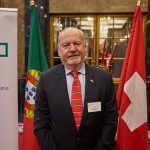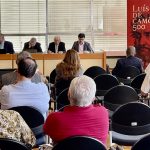IV International Congress on Angolan Studies makes commitment to strengthen international collaboration networks
The IV International Congress on Angolan Studies, a unique event, which brings together academics from around the world who study Angola, took place on June 18 at the National Library of Lisbon.
Organised by the Angola Research Network, it brings together more than 500 international researchers.
It has always a pluralistic space for tolerance and civilised discussion on the issues far removed from everyday polarization.
José Octávio Serra Van-Dunem, President of the Economic and Social Council of the President of the Republic of Angola, opened the Congress with a speech on the gains made since independence and the challenges for the country’s development.
Onofre dos Santos, a Constitutional Court judge, explained the constitutional choices regarding the design of the normative figure of the President of the Republic, while Dorothée Boulanger, from the University of Oxford, spoke about Angolan literature.
The panels were extremely varied, discussing the myths of the Angolan Constitution (Rui Verde), administrative reform (João Pinto, Inspector-General of State Administration), e-government in Angola and decolonisation and the teaching of the Portuguese language. (Veloso da Costa).
José Carochinho from U. Lusófona presented an opinion survey on the advances and setbacks in Angola’s 50 years of independence, while Carmen Monereo gave a presentation on TikTok and its use in the Angolan national languages.
Domingos da Cruz offered an extremely critical view of governance and opposition in Angola. The presentations by Sérgio Vieira da Silva and Jean-Jacques Wondo sparked heated discussion.
The IV International Congress of Angolan Studies stood out not only for its diverse themes, but also for the quality of the debate and the academic rigor displayed from many of the presentations.
Researchers from different generations and backgrounds brought interdisciplinary perspectives, crossing areas such as law, literature, political science, sociology, and cultural studies.
The interaction between participants fostered the sharing of methodologies, the questioning of established narratives, and the projection of innovative ways of thinking about Angola’s past, present, and future.
Throughout the parallel and plenary sessions, the vitality of Angolan studies as an expanding field of research, capable of engaging both academics and policy makers, was evident.
The congress ended with a note of collective commitment: to strengthen international collaboration networks, promote access to knowledge produced in Angola, and ensure that scientific research contributes effectively to more inclusive and sustainable development.
As one of the speakers rightly pointed out, “studying Angola is also imagining new possibilities for its future.”








